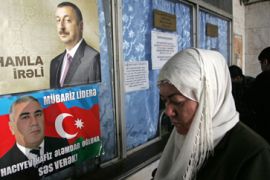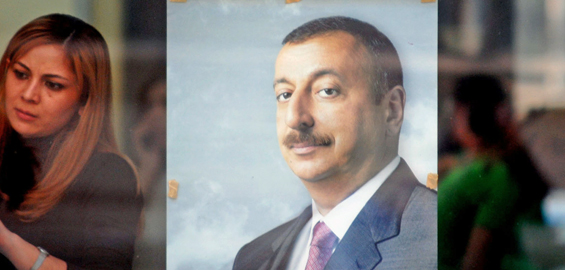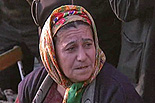Azerbaijani leader’s surefire win
Aliyev set to be re-elected in the resource-rich and geographically key nation.

 |
| Election posters in Baku only feature the incumbent president, Ilham Aliyev [AFP] |
Azerbaijan goes to the polls on Wednesday in an election where there is no contest.
It is all but guaranteed the winner will be the incumbent president, Ilham Aliyev.
| In video | ||
|
|
But he is proving to be a much needed ally for the US and Europe, providing oil to the West while being sandwiched in between Iran and Russia.
On the eve of the election we visited the markets in Baku to watch the capital’s residents haggling over the price of gherkins, grapes and potatoes.
There was even a man selling pomegranates from the back of a Lada motor car.
But amid the debate about food prices, there was little argument about who would win the election.
One market seller shouted to us: “Ilham Alivey, he is good.” The voting process here is as simple as that.
One real candidate
There are seven candidates in total, but Aliyev is the only one with any real chance of winning.
Even in the final days of the campaign period, the only visible campaign posters adorning the walls and windows of the central shopping district have been promoting his face.
We went to meet Hafiz Haciyev, one of the opposition candidates.
Critics say he’s just a proxy, competing in the poll in order to give the result some degree of legitimacy.
Not surprisingly he denies that, but professes he is a supporter of Aliyev.
I asked Haciyev why he has no less than five photographs of the current president dotted around his office.
“Well, I don’t love him, but I respect him because he’s an intelligent young guy,” he said. “But the people who surround him are crooks and bandits.”
‘Need western support’
The main opposition leader, Isa Gambar, isn’t bothering to run this time.
The Musavat Party has done well in previous elections and Gambar came second in the last presidential vote.
He, like many here who believe in democracy, feels abandoned by the West.
He said: “If the West doesn’t care about its own ideals of democracy and human rights, the security interests of the West and the energy interests of the world will be in serious danger.”
And pro-democracy supporters have good reason to be disappointed with their lot. At parks around central Baku, walls have been erected and seating removed.
Activists say the aim is to prevent public gatherings, which might threaten Aliyev’s hold on power.
Emin Huseynov is a well-known campaigner. “If you walk around this city you’ll see this stuff everywhere,” he said.
“These are preventative measures. The government has taken a strategic decision to block the right to gather in public.”
‘Meets international standards’
But despite all of this, the government claims the process meets international standards.
The ruling New Azerbaijan Party’s executive secretary said: “The elections will be free and fair, nobody has any doubt about that and we have no doubt.” There will be plenty who disagree.
Azerbaijan is strategically important to the West, in part because a million barrels of oil are being pumped out of here every day – in the direction of Europe.
But there are other reasons, and those are Russia and Iran.
Azerbaijan is located in the middle of the two countries, but allied to the West. That strategic position, many speculate, is the reason why Western leaders are willing to accept Aliyev’s iron-fisted approach to ruling this country.
Stability in Baku reduces the chances of increased Russian or Iranian influence over the resource-rich Caspian region.
Oil and geography have made this country a lot of money and the government too powerful to challenge.
Alivey may be an unpalatable ally for the West, but his ability to deliver oil and consistency here means he may be in power for a long time to come.
